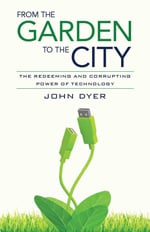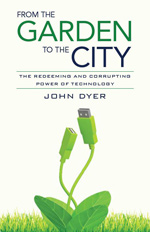From the Garden to the City: A Review
October 17th, 2011 | 6 min read

Eric Eekhoff is a reader of Mere-O who occasionally reviews books for us. His last contribution was the definitive review of Tim Challies's book on technology. I was thrilled to have him review my friend John Dyer's book as well.
Readers of his blog know that John Dyer is a careful thinker with a keen eye on how humans interact with technology.
 It comes as no surprise that we find these same characteristics in his book, From the Garden to the City. What we get in the book, though, that is impossible to replicate on a blog, is an extended narrative about how Christians should think about, live with, and use technology.
It comes as no surprise that we find these same characteristics in his book, From the Garden to the City. What we get in the book, though, that is impossible to replicate on a blog, is an extended narrative about how Christians should think about, live with, and use technology.
It is a well-known narrative to many - creation, fall, redemption, restoration - but Dyer manages to keep the familiar interesting with personal stories, pertinent examples, and thoughtful questions. Additionally, Dyer is well-versed in much of mainstream media studies and philosophy of technology, which he nicely incorporates into his narrative.
It’s interesting that before Dyer even gets to the first part of his story - Creation - he locates technology in our future, our imaginations. Our creation of technology rests on our ability to imagine reality otherwise. And our technologies shape the world in the ways we imagine (and often in ways we fail to imagine). Dyer also points out that our technologies in turn shape us. He uses the example of a shovel, which not only allows us to dig a hole but also changes our hands, shoulders, and back as we dig. Our hands become calloused, our shoulders become wider, and our back begins to ache as our hole becomes deeper. These questions about how we shape the world through technology and how technology shapes us leads to bigger questions about how we imagine the world should be. Why am I digging this hole? Why am I buying an iPad? We are making progress but towards what are we progressing?
Its in that context that Dyer begins looking at the Biblical story. Interspersed between the different parts of the four act story are brief looks at different aspects of technology. The result is a narrative that is compelling and orients the reader towards a Christian perspective of technology.
With that brief introduction to the book, I’d like to discuss a few criticisms with the hope of generating discussion. The few issues I bring up below don’t detract from Dyer’s book - I consider it to be the best introduction to the subject that I’ve read in a while. Anybody who is looking for thorough discussion of the book, I highly recommend the ongoing review at ChurchMag.
Dyer’s discussion of creation begins with the observation that one of the ways we are a reflection of God is in our ability to create. And the first act of creation that Adam performed was the naming of the animals. After this Dyer discusses human rebellion and its effect on technology. As I said above, in general Dyer tells this story well. But there were a number of statements throughout the book that left me scratching my head.
Dyer says that our ability to create is a good thing and it is part of what it means to be created in God’s image. He even locates the first technology - language - in the Garden of Eden. So clearly for Dyer both our ability to create and our first tools were pre-Fall. So far, so good. And later while discussing eschatology, he mentions that technology shouldn’t be viewed as a temporary thing - that on the new earth God will “restore even [our tools] to a sinless state.” Even better. Technology, according to Dyer, is found in both pre-Fall Eden and on the new earth. However, he later says “In some sense, all of our technology can be understood as an attempt to overcome the effects of the fall.” This seems to me to be in direct conflict with his previous statements. But even taken on its own, this statement fails to distinguish between our fallenness and our creaturely finitude. Many technologies function primarily as an aid to our finiteness rather than bridge to overcome the fall. The examples Dyer gives are shovels and tractors and epidurals and air conditioners. But what about telescopes and surf boards and pencils? We use telescopes to extend our vision beyond what is possible with the naked eye. And we use microscopes to bring minute creatures and details into focus. That my human eyes are limited in scope is because I am a finite creature. A distinction between finitude and fallenness would have been helpful, I think.
Also, throughout the book, Dyer regularly used computer programming terms to describe humans. We read that in Genesis God is said to be doing a sort of “programming of his own.” Dyer rephrases the question “what is the thing that we humans do that makes us human?” into “how did God program us?” He speaks about fish being programmed to swim, birds being programmed to fly and humans being programmed to cultivate. He writes about God’s “redemptive program” or his “program to redeem humanity.” The incident at the tower of Babel was an instance of God “reprogramming” human’s sense of self and language. Much of this can probably be read as a playful way remind us that our ability to create is a reflection of God’s. However, I think we have to be careful not to make God into our own image. Throughout history humans have had a tendency to describe ourselves in terms of the technologies of the day. Using the language of computer programming in the context of God’s creative and redemptive work suggests, to me at least, a kind of determinism that is unhelpful and untrue.
A final criticism of Dyer’s book (and, really, this is a criticism of most recent Christian books about technology) is that it was very individualistic and “use-centered.” By this I mean that most of the book was about how to get people to reflect on technology and change how they use it. From the time I pull a technology out of the box to the time I throw it away, how do I use it? How does it use me? What the book doesn’t address, though, is what happens before you take it out of the box. Who built it? What is it built out of? Where does it come from? Neither does the book address what happens after you throw the technology away. Does it go to a landfill? Is it recycled? Is it re-used? Does it sit in your garage for the next decade? The plastic bag - a technology that most of us use multiple times a week - has a life-cycle that is a lot longer than the 10 minutes it takes you to get from the store to your house. Again, this is not just a criticism of Dyer’s book - these questions haven’t even been brought up in most recent Christian books on the subject. It seems to me that if we take seriously the Bible’s call to not only cultivate this earth but to also keep it, we have to address these issues as well.
There was one paragraph near the end of book that I wished Dyer had developed a little more. In attempting to “foster the kind of relational world that Jesus and his disciples had” with his family, Dyer and his wife don’t use the phone and the computer from the time they get home from work until the time the kids go to bed. As his kids grow older, he plans on having them do the same as they start using these types of technologies. Dyer writes:
“When we are all disconnected from the world out there, it frees us up to be fully present with the people right here in front of us. When I go back to work, I spend my day on the Internet interacting with people and building websites, but I attempt to do so for the purpose of fostering embodied life, not replacing it. At home, I try to use technology to create focal space for our family to grow, and at work I create technology that helps others do the same."
What I would have liked Dyer to expand on is how he does this. Does he create technology that is easier to not use? Or does he create technology that doesn’t require people to refrain from using it in order to be “fully present?” To put it another way: Dyer began the book talking about imaginations and how our creation of technology is rooted in our ability to imagine differently. I would have liked to see how Dyer imagines computers and websites and cell phones differently. We don’t feel the need to unplug our refrigerator for an hour or two every day or to bathe in a nearby lake once a week instead of showering. Does he imagine computers being more like refrigerators and showers where we don’t have to refrain from using them?
Again, I raise these points not to detract from the book but because I liked the book so much. I’d encourage anybody who uses or makes technology (i.e., everybody) to read From the Garden to the City. You won’t find a better contemporary introduction to technology.
Matthew Lee Anderson is an Associate Professor of Ethics and Theology in Baylor University's Honors College. He has a D.Phil. in Christian Ethics from Oxford University, and is a Perpetual Member of Biola University's Torrey Honors College. In 2005, he founded Mere Orthodoxy.
Topics: